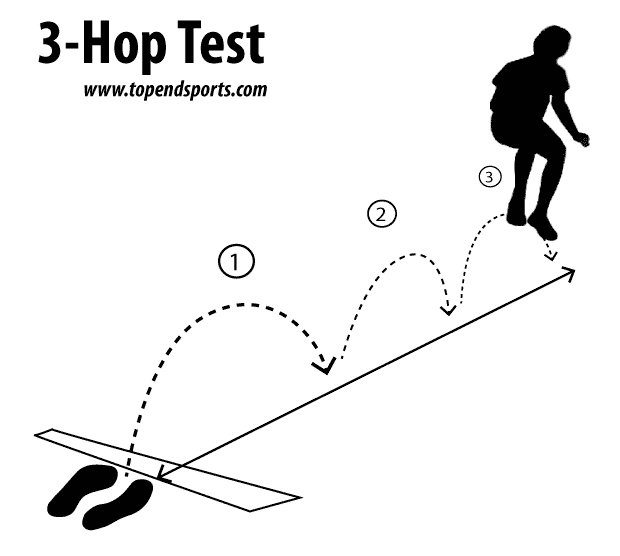The three-hop test is a test of explosive leg power, in which you have to perform three consecutive horizontal jumps, taking off both legs at once for each jump. There is also a similar 2-hop jump test and 5-hop test. The 3-Hop test is one of the four tests of the Quadrathlon Test.
test purpose: to measure horizontal and vertical power of the legs with a component of balance and coordination.
equipment required: tape measure to measure distance jumped, flat grass area. The starting take off line should be clearly marked.
pre-test: Explain the test procedures to the subject. Perform screening of health risks and obtain informed consent. Prepare forms and record basic information such as age, height, body weight, gender and test conditions. Measure and mark out the area using cones. See more details of pre-test procedures.
test layout: Stretch out approximately 30 feet of rope or tape measure to mark the hopping direction and to aid recording the jump distance.

procedure: The aim of this test is to perform three consecutive double-leg hops as far as possible. The athlete starts by standing behind a line with feet shoulder width apart. When ready, they are to perform three consecutive broad jumps non-stop, using a forward as well as a vertical jump style that allows them to gain maximum distance. They are able to use their arms assist the explosive movement and for balance.
scoring: The measurement is taken from take-off line to the nearest point of contact on the landing of the third jump (back of the heels). Record the longest distance jumped, the best of three trials. See some athlete results of the 3-Hop test.
variations / modifications: A long jump landing pit may be used instead so that the final jump lands in the sand, which enables the subject to confidently put more effort into the final jump, and to extend the legs further in front of the body for landing (this method results in higher scores for the 3-hop test). The test can also be conducted with any number of consecutive jumps (see the 2-hop and 5-hop versions). There is also a 3-hop stability test used in rehab, which involves three consecutive hops using the same leg.
advantages: this test is simple and quick to perform, requiring minimal equipment.
disadvantages: there is some skill component in this test.
comments: Falling or stepping backward after the landing will result in measurement to that point of contact rather than where the feet first touched. Some participants will try to use a step at take-off, which is not allowed.
Similar Tests
- Standing long jump test — a similar test of leg power
- 2-hop jump test — perform two consecutive horizontal jumps off both feet.
- Penta Jump (5-Hop Test) — perform five consecutive horizontal jumps off both feet.
- Quadrathlon Test
- Hop and Stop Test — a functional movement test which evaluates an individual's ability to hop and then come to a complete stop.
Related Pages
- See some results of the 3-Hop test.
- See the list of anaerobic tests for other fitness tests of leg power.
- The 3-hop test is part of a testing battery for the USA Women's Soccer Team.
- About the power quadrathlon, which includes the 3-Hop Test.
- Triple Jump athletics event


 Current Events
Current Events